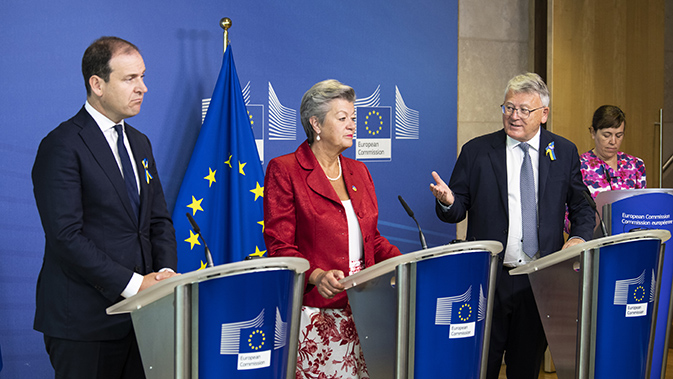
The report of Commissioner Schmit’s special adviser on integrating persons fleeing Ukraine into the EU, Lodewijk Asscher has been presented today. The report highlights the EU’s and Member States’ efforts to help Ukrainians fleeing the Russian aggression build new lives in communities across the EU. The report includes information on EU funding to support Member States welcoming people fleeing from Ukraine.
Through the CARE and FAST-CARE initiatives, the EU and Member States have so far used more than €1 billion from the European Social Fund (ESF), the European Rural Development Fund (ERDF), and under REACT-EU to finance programmes, which help people integrate into the EU. Furthermore, the Commission has launched the EU Talent Pool Pilot to match people’s skills with job offers so they successfully find work in the EU.
Commissioner Schmit stated, 'Thanks to the activation of the Temporary Protection Directive, people fleeing Ukraine have been given access to the labour market and social welfare assistance, to help them build a new life in the EU for as long as they need or want to stay. Investments made by Member States through their cohesion policy programmes now amount to more than €1 billion. We are more determined than ever to continue our action to give the people displaced from Ukraine a safe haven in our European societies. I thank Lodewijk for his insights, and for helping us reach out to people on the ground, to learn what their needs are.'
ESF supported relief efforts
Nearly €685 million of ESF investments have been re-allocated to aid Ukrainians. ESF funding helped, for instance, to set up regional integration centres for migrants in Poland, offering language courses to help them find a job in the country. Germany’s Lower Saxony region has applied nearly €15 million in ESF funding to launch a new language-support programme for refugees, helping people fleeing Ukraine with language support, social integration, social education, childcare, as well as preparing participants for eventual training, studies or work. In Bulgaria, the ‘Solidarity’ project has provided Ukrainian refugees with accommodation and financial support as well as workshops to develop job skills and in Czechia an ESF+ call for proposals aims to improve access to social housing for displaced Ukrainians.
The European Social Fund Plus (ESF+) will continue to support the integration of people fleeing the war in Ukraine. Mutual learning exchanges between ESF+ and other managing authorities will be organised. This will allow funding authorities and other ESF+ stakeholders to discuss the integration of third-country nationals and exchange good practices.
The report uses information gathered from the Special Advisor’s missions to Member States, as well as exchanges with representatives from public authorities and key stakeholders. It gives an overview of good practices for supporting people fleeing Ukraine in the areas of work, housing, education, and healthcare, and emphasises the work the EU has undertaken to provide support from the first week of Russia’s full-scale invasion in Ukraine. Measures have enabled Ukrainians fleeing the war to be given immediate access to the labour market, education and vocational training, healthcare, social benefits and accommodation.



